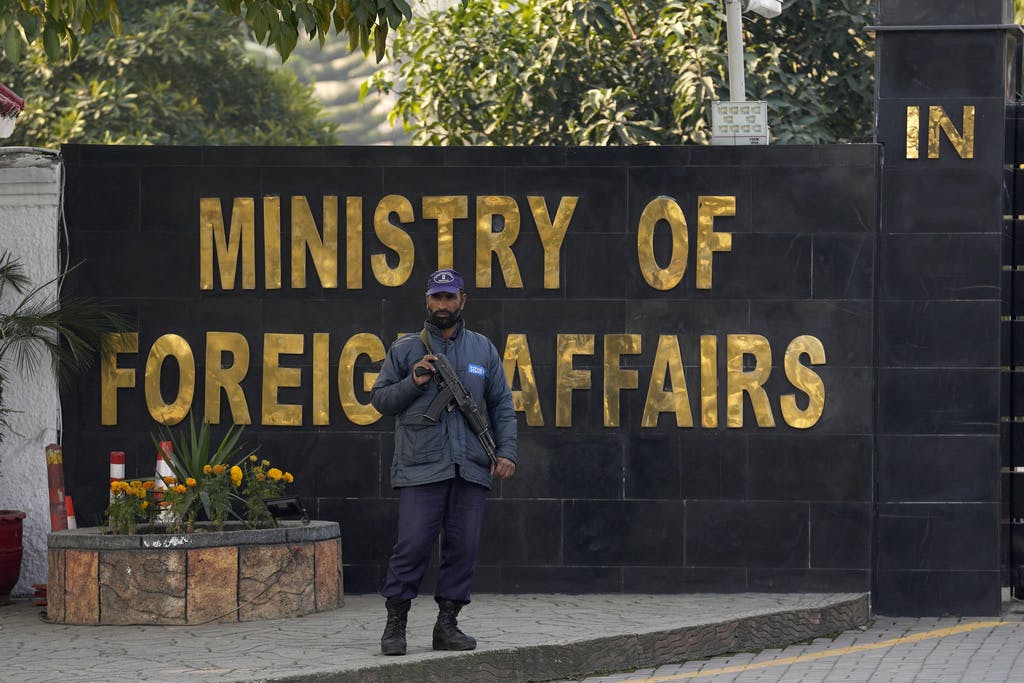Iran, Pakistan Tentative in Attacking Each Other — So Far
Several points of contention between a Sunni-majority, nuclear-armed Islamist state, Pakistan, and a near-nuclear one that sees itself as leader of all Shiites and all Islam, Iran, have the potential to ignite a major conflagration in South Asia and beyond.

Like top boxers feeling each other out in the early moments of a bout, Iran and Pakistan are exchanging fire, but very carefully — at least for now. Several points of contention between a Sunni-majority, nuclear-armed Islamist state, Pakistan, and a near-nuclear one that sees itself as leader of all Shiites and all Islam, Iran, have the potential to ignite a major conflagration in South Asia and beyond.
After bombing so-called terrorist targets near the Pakistani border inside Iran Thursday, Islamabad was eager to stress that the Islamic Republic was not the intended victim. “Iran is a brotherly country and the people of Pakistan have great respect and affection for the Iranian people,” the Pakistani foreign ministry said in a statement.
The attack followed an Iranian one inside Pakistan two days earlier. “We only targeted the Iranian terrorist group on the soil of Pakistan,” Tehran’s foreign minister, Hossein Amir-Abdollahian, said while attending the economic forum at Davos. “We respect the sovereignty and territorial integrity of Pakistan, but we don’t allow national security to be compromised or played with.”
Both sides were targeting Balochistan, a territory on the Pakistani-Iranian border, each for its own reason. Iran said its air bombing in Pakistan targeted a separatist Baluch group, Jaish al-Adl, or Army of Justice, which has long been accused by Terhan of undermining the Islamic Republic’s regime.
Tehran contends that Jaish al-Adl was behind the early January explosion at the gravesite of Qassem Soleimani that killed mourners. It also targeted ISIS positions in Syria and Kurds in Iraq; it claimed both were involved in the bombing.
Pakistan, meanwhile, accuses Baluch separatists of targeting the China-Pakistan Economic Corridor, a $58 billion project that is part of Beijing’s Belt and Road Initiative. It runs inside Balochistan. Communist China covets the largely ungoverned, mineral-rich area.
Pakistan said that on Thursday it targeted the two separatist groups, the Balochistan Liberation Army and the Balochistan Liberation Front, which it claims are hiding on the Iranian side of the border. The groups say they have no presence in Iran.
Yet, tensions between Iran and Pakistan are simmering beyond the mirror-image allegations over Baluch groups. Pakistani extremists, for one, increasingly harass and assault the country’s Shiites, a 10 percent minority in the mostly Sunni country. Iran sees itself as a rising Islamic power and a defender of all Shiites.
“Pakistan is doing a double hit on Iran,” the executive director of India’s Hindustan Times, Shishir Gupta, tells the Sun. Iran, he says, assumes that “you cannot operate in Balochistan as a group like Jaish al Adl without the support of Pakistan.” Meanwhile, he adds, Iranians also believe that Pakistan “needles” them on behalf of American agencies.
Of the two counties, Mr. Gupta says, “I would be more worried about Iran, a mad nation that thinks itself a leader of Islam. It may take time, but Iran will retaliate again against Pakistan.”
Pakistan conducted two nuclear tests in 1998, four years after India became a nuclear-armed state. Pakistan is now believed to own 170 nuclear warheads. Iran has been the subject of intense nuclear negotiations for years, and in 2015 President Obama cut a deal meant to slow the Islamic Republic’s race to a bomb.
The International Atomic Energy Agency was charged with ensuring the deal’s implementation. By now the IAEA is increasingly “frustrated” by Iran’s lack of transparency. The agency inspectors “figure Iran now has sufficient quantities of highly enriched uranium to build several atomic warheads,” its director general, Rafael Mariano Grossi, told Bloomberg News Thursday at Davos, Switzerland.
Washington has been frustrated with Iran’s growing regional belligerence, which now extends beyond the Mideast to southern Asia. Yet, while Americans occasionally go after Iranian proxies in Iraq and Syria, and now target the Houthis in Yemen, President Biden is careful not to hit Iran directly.
Israel, meanwhile, is claiming to combat the “head of the octopus” directly. “Who told you we are not attacking inside Iran? We are,” Prime Minister Netanyahu told Israeli reporters Thursday.
“Everything you see, from the Houthis, to Hezbollah, to Hamas, Iran is behind it,” Mr. Netanyahu said, adding that the Islamic Republic attacks “the region’s governments, undermines international shipping, and threatens the entire world. Iran is doing it now, when it doesn’t have a nuclear weapon, imagine how vital it is that we stop it from obtaining a nuclear weapon.”
Under his leadership, Israel has “slowed them down for at least 10 years, but we have not stopped them,” he added. Yet, Iran remains “a few steps” behind, and he is determined to block its access to nuclear weapons — “not only for our security, but for the security of the entire world.”

